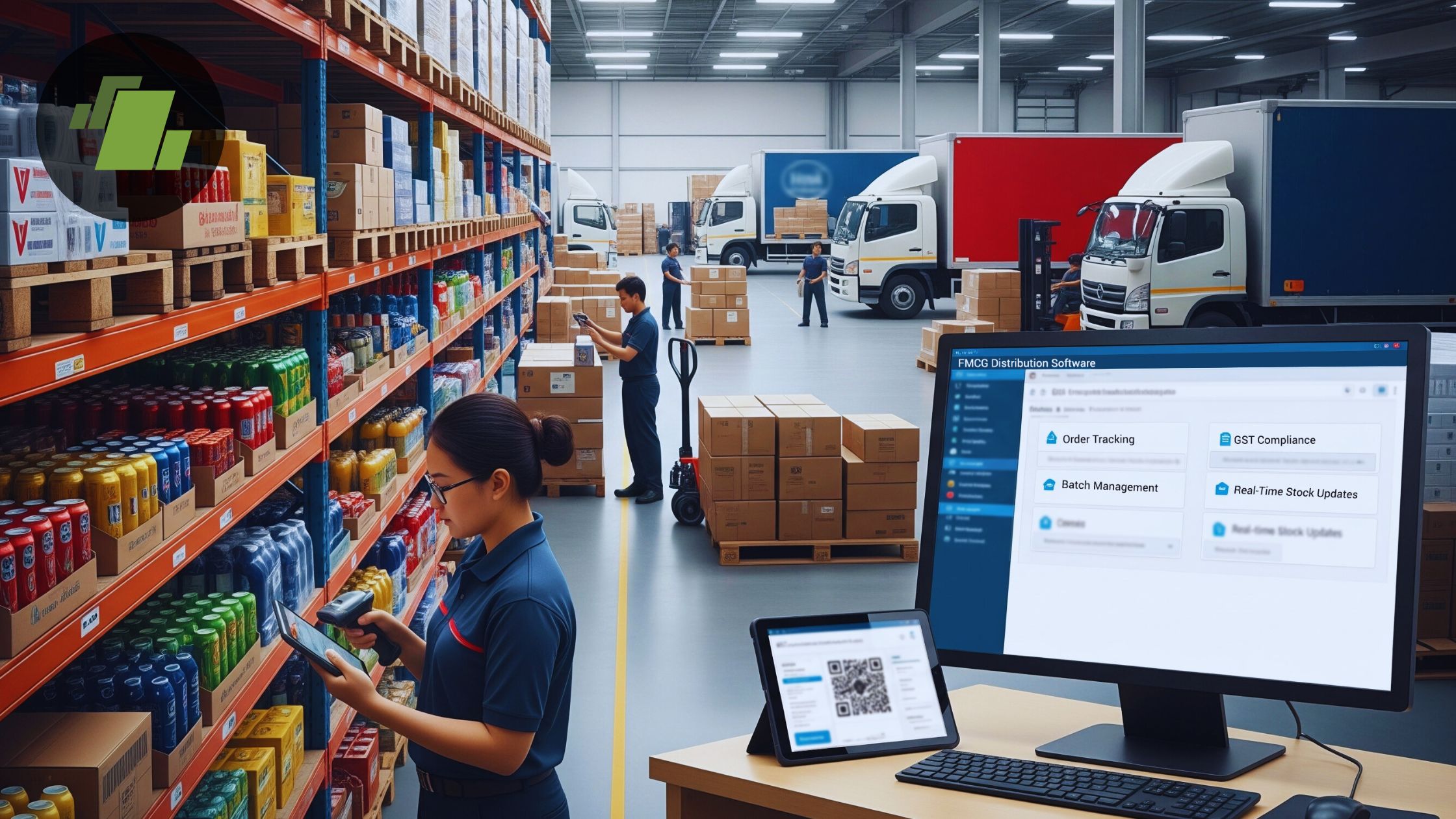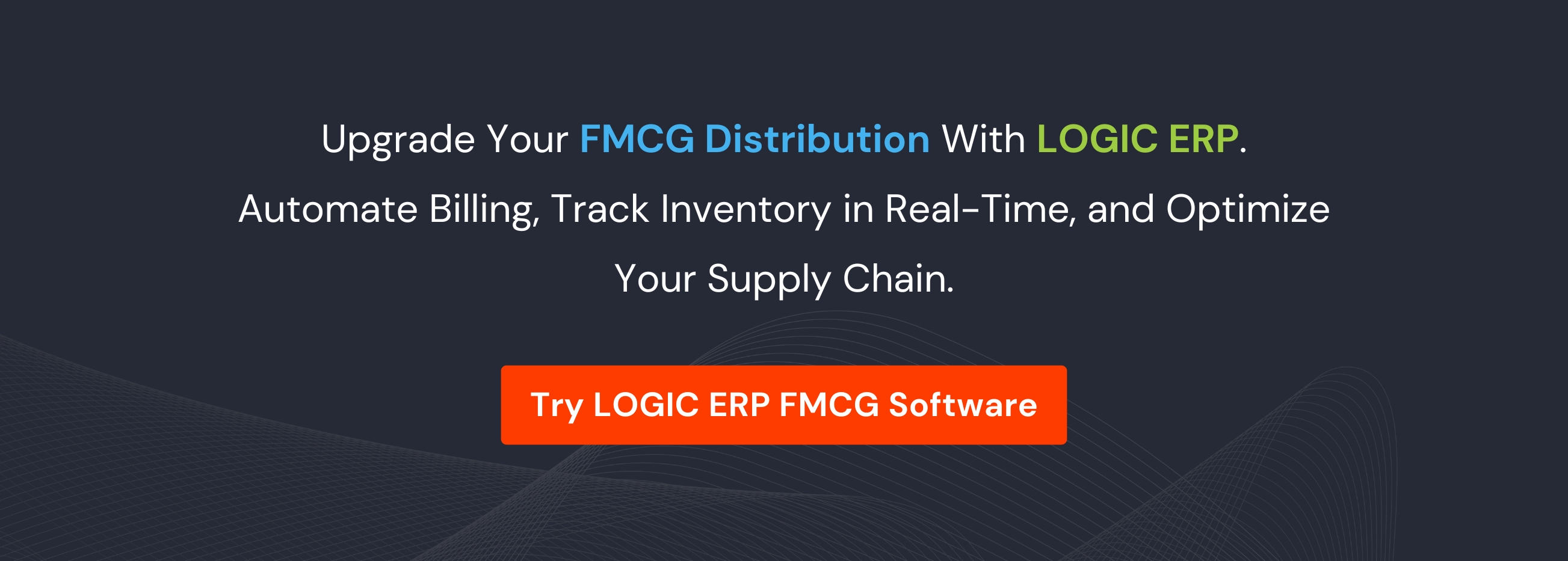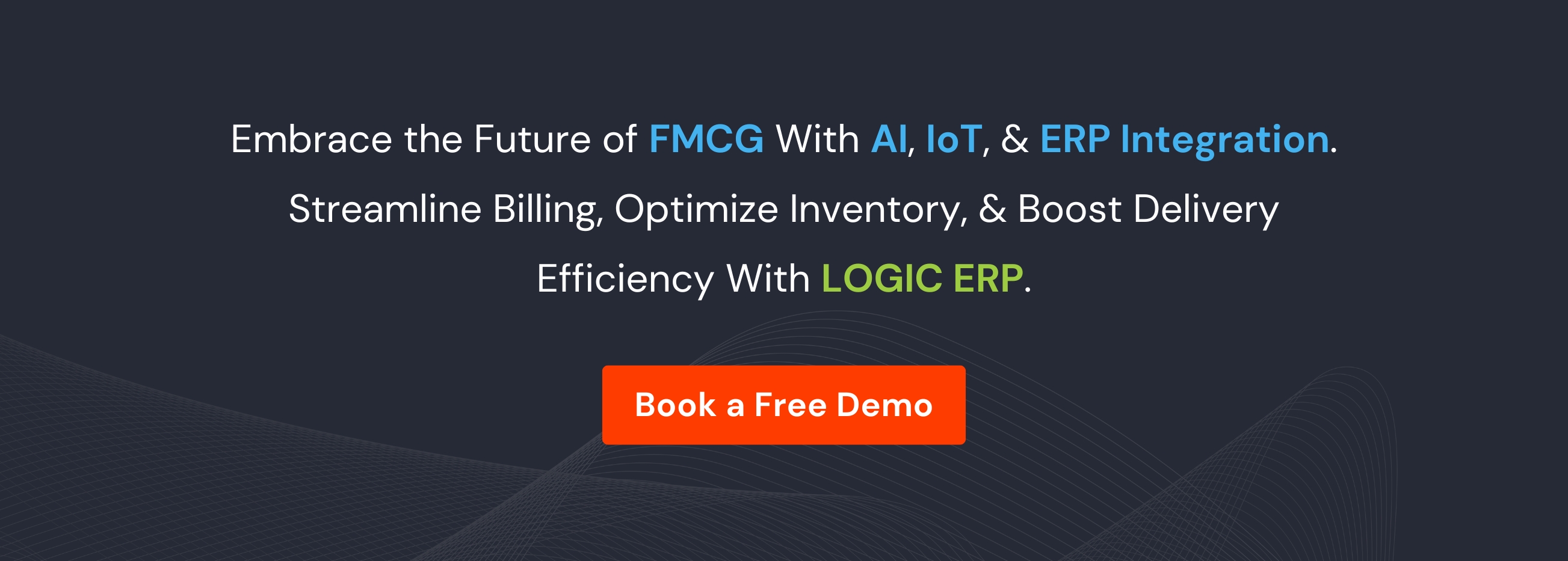The Future of FMCG Distribution: AI, IoT & ERP Integration


Summary
The future of FMCG distribution is smarter, faster, and more connected. With AI, IoT, and ERP integration, distributors can overcome challenges like stockouts, delayed deliveries, and manual inefficiencies. LOGIC ERP is leading this transformation by offering FMCG distributors a platform that combines the power of ERP with real-time IoT data and AI-driven intelligence.
Key Takeaways
- FMCG distribution is moving toward automation, real-time visibility, and predictive intelligence.
- LOGIC ERP empowers FMCG distributors to streamline billing, inventory, warehousing, logistics, and compliance.
- Early adopters of AI, IoT, and ERP will lead the next era of FMCG distribution.
Introduction
The FMCG (Fast-Moving Consumer Goods) sector is one of the most dynamic industries in the world. From packaged foods and beverages to personal care and household essentials, FMCG products are sold in massive volumes every day. Distributors, wholesalers, and retailers form the backbone of this industry.
But here’s the challenge: consumer behavior and preferences are changing everyday. People want instant availability, same-day delivery, personalized promotions, and competitive pricing. E-commerce giants, quick-commerce players, and modern retail chains have raised the bar. The future belongs to distributors who are adopting technology : AI (Artificial Intelligence), IoT (Internet of Things), and ERP (Enterprise Resource Planning), to build faster, smarter, and more connected supply chains.
This article explores in detail how AI, IoT, and ERP are reshaping FMCG distribution, why businesses must adopt them now, and how LOGIC ERP is enabling this transformation.
Why FMCG Distribution Needs a Technological Revolution
FMCG Distributors and wholesalers today deal with:
- Thousands of SKUs (Stock Keeping Units) across categories like food, beverage, household, and personal care.
- Multi-location warehouses and stockists that must stay perfectly synchronized.
- Retailer demands for faster deliveries (sometimes within hours, not days).
- GST compliance, e-invoicing, and regulatory requirements that cannot be ignored.
- Razor-thin margins, where even a small inefficiency can eat into profits.
For example, imagine a distributor handling 500 retailers across multiple towns. If one route gets delayed, retailers face stockouts, and consumers switch to competitors. If inventory data is not updated in real-time, excess stock may pile up in one warehouse while another location runs dry.
The FMCG industry needs connected intelligence that only ERP, AI, and IoT together can provide.
The Role of ERP Software in FMCG Distribution Business
ERP connects every link in the FMCG supply chain, integrating billing, accounting, inventory, logistics, sales, and compliance into a single unified system. An advanced FMCG distributor software helps businesses:
- Automate wholesale and retail billing
- Optimize inventory with reorder alerts and stock visibility
- Enable multi-location management across warehouses and distributors
- Simplify GST compliance with automated tax filing and e-invoicing
- Provide data-driven insights for faster decision-making
ERP ensures operational efficiency, but with AI and IoT integration, it becomes a smarter ecosystem capable of predictive decision-making.
Artificial Intelligence (AI) in FMCG Distribution Industry
AI (Artificial Intelligence) is transforming FMCG distribution from reactive to predictive. Here’s how:
a) Demand Forecasting
AI analyzes sales patterns, seasonal trends, and external factors (festivals, weather, events) to predict demand. Distributors can stock efficiently, avoiding both stockouts and overstocking.
b) Route Optimization
AI-powered ERP systems for FMCG distributors suggest the most efficient delivery routes, reducing fuel costs and delays. For FMCG distributors managing hundreds of routes daily, this saves time and money.
c) Personalized Promotions
AI analyzes consumer purchase history and suggests targeted schemes, offers, and discounts to retailers. It ensures promotions are data-driven, not guesswork.
d) Automated Credit Risk Management
AI evaluates retailer payment patterns and suggests credit limits to reduce bad debts and improve cash flow management.
e) Chatbots and Virtual Assistants
AI-powered bots integrated with ERP allow retailers and distributors to place orders, check invoices, or track deliveries via WhatsApp or mobile apps.
IoT in FMCG Distribution Business
IoT (Internet of Things) brings real-time visibility into FMCG operations by connecting physical assets to ERP systems.
a) Smart Warehousing
IoT-enabled sensors track temperature, humidity, and stock movement, important for FMCG products like dairy, beverages, and packaged foods.
b) Fleet Tracking
IoT-enabled GPS systems allow distributors to monitor delivery trucks in real-time, ensuring on-time deliveries and reducing pilferage.
c) Automated Stock Replenishment
Retail shelves equipped with IoT sensors send real-time stock updates to distributors. ERP auto-generates replenishment orders, ensuring shelves never go empty.
d) Cold Chain Monitoring
For perishable goods, IoT sensors ensure temperature control across the supply chain, reducing spoilage and losses.
e) IoT-ERP Integration
When integrated with ERP like LOGIC ERP, IoT devices feed live data into dashboards, helping distributors act immediately on supply chain disruptions.
How LOGIC ERP Powers the Future of FMCG Distribution
LOGIC ERP software for FMCG distributors, wholesalers, and manufacturers helps in handling end-to-end operations.
- Unified Billing & Accounting: Automates wholesale, retail, and GST-compliant billing.
- Smart Inventory Control: AI-driven reorder levels, demand forecasting, and expiry tracking.
- IoT-Enabled Warehouse & Logistics: Real-time visibility of stock and fleet.
- Multi-Channel Distribution: Supports retail, wholesale, e-commerce, and D2C.
- Mobile ERP Access: Sales teams, distributors, and retailers can place and track orders on-the-go.
- Data-Driven Decisions: AI-powered dashboards provide actionable insights on sales, schemes, and expenses.
Benefits of AI, IoT & ERP Integration for FMCG Distribution
- Reduced Operational Costs through automation and route optimization
- Higher Sales & Profitability via better demand forecasting and promotions
- Improved Retailer Relationships with faster billing and order fulfillment
- Zero Stockouts thanks to real-time replenishment alerts
- Regulatory Compliance with GST, e-invoicing, and tax integration
- Increased Transparency across supply chain with IoT-enabled tracking
- Scalability – easily expand to new territories without complexity
Conclusion
The future of FMCG distribution lies in the seamless integration of AI, IoT, and ERP. Together, they enable real-time visibility, smarter decision-making, and faster operations. With LOGIC ERP, FMCG distributors can automate billing, streamline supply chains, and stay future-ready. Businesses that embrace this digital shift with LOGIC ERP will lead the competitive FMCG market tomorrow.
Call at +91-73411-41176 or send us an email at sales@logicerp.com to book a free demo for FMCG distribution ERP software today!
Frequently Asked Questions (FAQs)
Q1. What makes ERP essential for FMCG distribution?
ERP unifies billing, inventory, compliance, and logistics into one system, enabling faster and more efficient operations.
Q2. How does AI benefit FMCG distributors?
AI improves demand forecasting, route planning, promotions, and credit risk management.
Q3. What is the role of IoT in FMCG?
IoT ensures real-time tracking of inventory, vehicles, warehouses, and cold-chain logistics.
Q4. Why integrate AI, IoT, and ERP?
Because integration ensures real-time data (IoT), predictive intelligence (AI), and centralized execution (ERP).
Q5. What is ERP for FMCG distribution, and why do I need it?
ERP for FMCG distribution is a complete software system that helps you manage inventory, billing, logistics, and multiple warehouses, all from one place. It’s essential because it keeps operations smooth, reduces errors, and saves time for distributors and wholesalers.
Q6. How can FMCG distribution and wholesale billing software make my business more efficient?
This software automates invoicing, order tracking, and credit management. It speeds up processes, ensures accurate bills, and makes managing multiple retailers much easier, especially when integrated with an ERP system.
Q7. Does FMCG distribution billing software handle GST compliance?
Yes. Modern billing software calculates GST automatically, generates e-invoices, and keeps your tax records organized. This means you stay compliant without the usual paperwork stress.
Q8. What features should I look for in FMCG distribution business software?
The most important features include real-time inventory tracking, multi-location management, automated billing, reporting and analytics, and easy integration with other systems like ERP and accounting software.
Q9. How does FMCG management billing software simplify discounts and promotional offers?
It automatically applies discounts and promotional schemes across all your orders, so there’s no manual calculation. This helps you avoid errors and makes your retailers happy with accurate billing every time.
Q10. Can ERP for FMCG distribution work with AI and IoT?
Absolutely. Modern ERP systems can integrate with IoT devices for live inventory updates and use AI to predict demand, optimize delivery routes, and provide insights that help you plan smarter.
Q11. Is FMCG distribution and wholesale billing software suitable for businesses with multiple locations?
Yes. It centralizes all your stock, sales, and billing information, no matter how many warehouses or retail outlets you manage. This makes multi-location distribution easier and more transparent.
Q12. How does FMCG distribution billing software reduce human errors?
By automating invoice generation, stock updates, pricing, and tax calculations, it removes manual mistakes and ensures your records are accurate and consistent.
Q13. Who benefits the most from FMCG distribution business software?
Distributors, wholesalers, retailers, and manufacturers all benefit. It helps them streamline operations, manage stock efficiently, improve billing accuracy, and get valuable insights for better decision-making.




